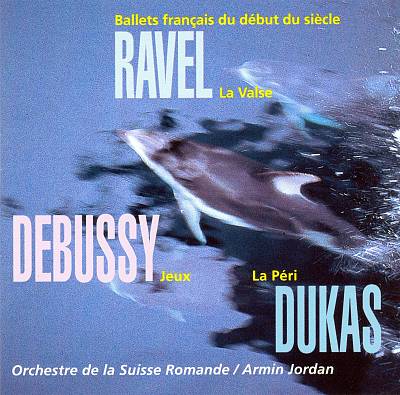La Valse – Jeux – La Péri – Armin Jordan

| Ayant entendu cette version de Jeux il a de nombreuses années à la radio, je désespérais de mettre la main dessus.
C’est génial de bout en bout – mais il s’agit d’une compilation (Cascavelle à partir des enregistrements de la défunte Erato – que vient faire le dauphin sur la pochette ?), probablement introuvable de même que les albums originaux. Parfois, pour gagner du temps, j’écris mon papier en même temps que j’écoute ; là, pas moyen : une extase quasi continue m’en a empêché… Cette compilation « ballets français du début du siècle » est légitime, puisqu’elle comprend donc La Valse de Ravel (1920), Jeux de Debussy (créés par Monteux 2 ans avant le Sacre) et La Péri de Dukas (1912). La ValseOn n’attendait pas a priori ce chef dans cette œuvre, préjugé vis-à-vis d’un chef qui était en fait aussi suisse-allemand que suisse-français… On souhaite à son fils si talentueux autant de réussites discographiques que cet exemple, surtout d’aussi bons directeurs artistiques et techniciens… JeuxSans avoir fait de discographie comparée de cette œuvre, voici sans doute une de ses interprétations majeure : dans cette œuvre de près de 19′ aux 60 changements de tempo, le chef nous guide de main de maître : de la vie, des timbres ; l’intrigue de ce « poème dansé », bien mince, est ici vite oubliée pour se laisser bercer ; encore une fois, l’équilibre ligne / harmonie / rythme de chaque « épisode » est donné dans un tout cohérent et si vivant, voire ensorcelant ! Outre le fait que l’on sent que Jacques Ibert a copié certaines mesures pour Escales, on est frappé de certains similitudes avec Ibéria et surtout vers la fin de connivences avec la musique de l’auteur de L’apprenti sorcier… qui suit justement. La PériEt justement voici La Péri créée la même année que Jeux, ouvrage d’un grand maître, même si Debussy était, lui, un génie. Un mot de l’orchestre de la Suisse romande qui aura donc eu 2 chefs, Ansermet et Jordan : je pense que ça aurait été moins bien avec Vienne ou Berlin pour ce répertoire. Ne pouvant mettre Jeux, ici la Fanfare de la Péri :
|
Having heard this version of Jeux many years ago on radio, I despaired to put the hand on it. It is brilliant from beginning to end – but this is a compilation (Cascavelle from the recordings of late Erato), probably unavailable just as the original albums. Sometimes, to save time, I write my paper at the same time as I listen; here, not way : a ecstasy quasi continuing prevented me…
This compilation “French ballets of the beginning of the century” is legitimate, since it thus includes La Valse by Ravel (1920), Jeux by Debussy (created by Monteux 2 years before the Rite) and La Péri by Dukas (1912). La ValseOne did not await a priori this conductor in this work, prejudged with respect to a conductor who was in fact as Switzerland-German as Switzerland-French… We wish to his so talented son as many discography successes than this example, especially such good artistic directors and technicians… This work makes it possible to characterize the art of the direction of Armin Jordan, but it is difficult, because all is there: magnified tones, comprehension of the score, a perfect control of the sound plans, a certain rhythmic freedom in a superiorly built unit: the score really sounds and especially we have the impression to attend to a re-creation of work. For me, only Kubelík, even more artist, but less “frank of the collar”, often gave this impression. JeuxWithout compared it to other versions, here is undoubtedly one of its major interpretations: in this work of almost 19 ‘ with the 60 changes of tempo, the conductor guides in Master hands: life, tones; the intrigue of this “danced poem”, quite mean, is quickly forgotten here to be let rock; once again, balance line/harmony/rhythm of each “episode” is given in a coherent and so alive whole, even bewitching! In addition to the fact that we feel that Jacques Ibert copied certain bars for Escales, we are struck by certain similarities with Ibéria and especially towards the end in complicities with the music of the author of the Apprenti sorcier… who precisely follows. La PériCreated precisely the same year as Jeux, is a work of a true Master, even if Debussy was, him, a genius. The slowness of the developments of Dukas makes me think of a music of gardener (of which I am) what does not want to say that that misses ardor by place, as Jordan returns it so magisterially: all is so well proportioned, sounding, living, opulent and… beautiful! Sample on left (Péri’s Fanfare). |
